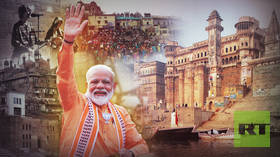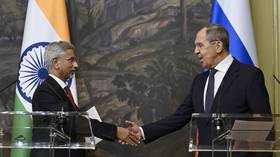‘God has sent me for a purpose’ – India’s Modi
The Indian prime minister, who is eyeing a third term in office, has claimed that the almighty is directing his actions
Indian Prime Minister Narendra Modi has claimed that God has sent him “for a reason” and that his work “will be done” once the purpose is achieved.” The Indian leader made the statement during his latest interview with the news channel NDTV amid the six-week-long election in the country.
Modi, who is seeking a third term as the prime minister of the world’s most populous country, has lately appeared in a string of interviews with several prominent news channels. “I am convinced that God has sent me for a purpose and once that purpose is completed, my job will be done,” he told NDTV, adding that he has “completely devoted” himself to God.
When asked what his “purpose” is, Modi said that God has not revealed the plans to him. “He keeps making me do things; I do not have direct access to dial him to ask what plans he has for me.”
Campaigning during the ongoing election has been heating up, with Modi triggering several controversies on the trail. India’s independent election body has warned the Modi-led Bharatiya Janata Party (BJP) and rival Congress party against campaigning on the basis of caste, community, language, and religion.
“You will find 10 people who will hurl the foulest abuses toward me, and 50 who will have good things to say”, Modi said. “My duty is to ensure that the ones who express goodwill are not hurt, so I try to carry out the duty.” The Indian leader also asserted that he does not view the leaders of the opposition as his “enemies,” and wishes to work with them.
During his second term in office, Modi fulfilled three of the core pledges he made in 2019: overturning Article 370 of the Constitution granting special rights to the Kashmir region, enacting a citizenship act to fast-track naturalization for ‘minority’ communities from Afghanistan, Bangladesh, and Pakistan, most of them belonging to the Hindu religion, and erecting a temple devoted to the Hindu deity Ram in Ayodhya on a contested plot of land where a mosque had once stood.
In 1992, the 16th-century mosque was razed by Hindu nationalists, who believed that Muslim invaders had erected the building on the ruins of a Hindu temple. After a trial spanning 18 years that sought to determine whether Hindus or Muslims were the rightful owners of the land, the Supreme Court of India sided with the Hindus in 2019, paving the way for a temple dedicated to the deity. The temple, built for around $200 million, was inaugurated in January.
The Indian prime minister is seeking re-election from Varanasi, a town considered sacred by the Hindus. Polling in the constituency will be held on June 1, the seventh and last phase of the election. Votes will be counted on June 4.





